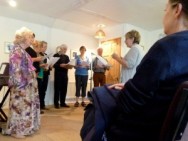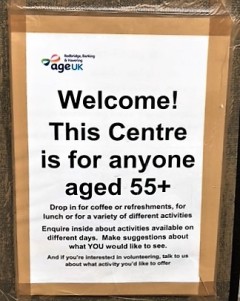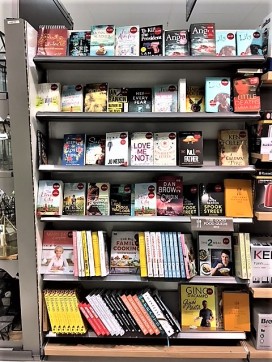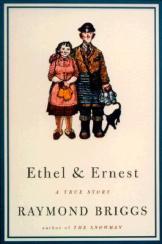A few days ago I added my own novel to a new Facebook page, Books for Older Readers. It says it’s “for readers over 50 and writers who write books which appeal to this age group. Please join if you write, read, blog or recommend books for the over 50s.”

with Penny Jenkins
… fun course is for all singers, any ability, no upper age limit! Rediscover the joy singing brings …make music for many years to come. Benefits to health, happiness, general well-being.
(Digression #1 – we oldies are allowed to ramble – coincidentally I had an email today from Jackdaws with a singing course for the over 50s. I went on an all ages course there once and it thoroughly rejuvenated my voice! Recommended.)
I’m broadly in agreement with the aims of Clare Baldry, the retired headteacher and author who set the page up. Of course it raises all sorts of questions, not least: what is “older”? I’m still in my 50s, and never took much trouble to keep very fit, but I’m disconcerted (and worse) to find several university peers already dead, and myself and others beset by serious eyesight problems, cancers, arthritis and so on. The recent death at 51 of comedian Sean Hughes banged another nail in our collective coffin. And yet…many of us have started new careers and hobbies and the if UK Old Age Pension isn’t now going to start for me until I’m 66 or 67, how can I be “old” before that? Baldry’s 50+ is a wide age group in a country where average life expectancy is now 79 for men and 83 for women. But my local community centre stubbornly continues to offer services for older people from age 55, and many sheltered housing complexes offer flats to anyone over the same age (a complex is what I’d have if I bought one now).
However, we probably do read different books, or at least in a different way. Everyone’s experienced returning to a book they adored as a young adult to find it either still wonderful, or a bit quaint, or boring, or completely discordant. Fashions in writing style and content change. It seems to me the books I read when younger were wordier, quieter, more thoughtful. Sentences were longer; interior monologues and third person narration and omniscient narrators and multiple points of view and extended scenes and assumptions of background knowledge and intense concentration on the reader’s part were taken for granted. The short sentences, staccato scenes and gasping plots of today’s girls on trains and the extreme violence of some contemporary crime novels are just too shallow and voyeuristic for me, while “cosy crime” is too silly. But a good well written thriller is always fun to read.
(Digression #2: Specific annoyances for a mid 50s woman standing up on a rush hour tube. i) Everyone sitting down is much younger than I am. ii) If they stand up for me it must be because they think I look really old. iii) None of them stands up for me.)

Of course, most over 50s once had access to good bookshops and/or libraries. We are more familiar with leisurely browsing through hardbacks and paperbacks, not the spurious “look inside” you get on Amazon or the tiny selection of middle and low brow bestsellers and celebrity publications in the local supermarket. We either still do, or once had, better concentration.
Digression #3. It would bore you, and me, if I researched any evidence for that last statement. (Or would it?)
As an ex teacher, I dislike sweeping generalisations about literacy levels (which are influenced by so many complexities it should be illegal to make them), but many of us were educated (or at least went to school) at a time when vocabulary and style were seen as just as important as phonics and genre, when we wrote “compositions” ourselves and when adverbs were not seen as a disease to be stamped out. My vintage is no doubt betrayed by the length of my sentences and my use of the passive voice. What we read influenced how we wrote as children; how we wrote as children influences how we write now. The editors to whom agents submit are in their late 20s and early 30s now: “whom” just makes them say “what?” and they chuck the (virtual) manuscript straight onto the (virtual) slush pile with a brief “Sorry, I just didn’t love it enough” to the agent,or worse, an out of office reply they’re on maternity leave..
After a while, however perceptive your browsing, you do find you’ve read the same thing rather too often. No more inner thoughts at dinner parties for me! I’m also done with the first and second world wars (with an exception for A God in Ruins), the Holocaust, the Dustbowl and Depression, most dystopias (I stopped at Aldous Huxley, George Orwell and John Wyndham), university novels, early mid life crises (“…at nearly 40, X worries her life is running away with her…”). The Child in Time by Ian McEwan did child abduction in exemplary fashion years ago and needs no revisit. I don’t think I want to read about the miseries of old age either. As a student I admired and was moved by Simone de Beauvoir’s “A Very Easy Death“. But as a student, I hadn’t yet experienced the death of my own parents, and my back didn’t hurt, I didn’t have to laugh off “senior moments” (how that grates!) and hadn’t started to dislike snow and wet leaves on the pavement.
Matthew Thomas’ We Are Not Ourselves was brilliantly written but grimmer than grim, especially describing dementia that started in middle age. Unadulterated old age is tedious: I began to read Margaret Drabble as a teenager and followed her heroines through youth and middle age as we all matured, but she’s twenty years ahead of me. Last year’s The Dark Flood Rises has too much banal details of food spilling, not being able to run for buses, and too much reflected loss of confidence. Her writing, like our skins, is less fresh, less taut. It disappointed me. (I feel guilty, writing that. A book entirely full of old people: how dare they be so visible? They are not so in the street, in public, on the tube. How inconsiderate of them and their elderly author. And my own confidence takes a further tumble. If Drabble, with her stellar career, is past it, perhaps I should stop submitting to publishers much sooner.)
But my rules are made to be broken! The Oxfam shop supplied me with The Lie this morning. It’s about the First World War, but it has the quality mark of Helen Dunmore who sadly, has not lived to be old. I romped through Elizabeth is Missing by Emma Healey, perhaps because the humour and the detective element leaven the awfulness of the heroine’s confusion. Doris Lessing’s readable, poignant, funny, informative memoir Alfred and Emily was published when she was 89, five years before she died. At nearly 100, Diana Athill published an elegant, witty memoir from her retirement home, Alive, Alive Oh!
Good or bad, we can’t only read about old, and much older age. Well written books whose characters and concerns span several generations work well for older readers too, and may be more cheerful, with their cyclical sense of renewal. Elizabeth Jane Howard’s Cazalet novels, Kate Atkinson’s Life after Life, Maggie O’Farrells This Must Be The Place are in the same tradition, and we love them because we have experience of all the age groups.
Whoops, another rule broken: as a child I devoured the Jalna books. Mazo de la Roche’s now forgotten series based on a family in the Southern States of the USA fascinated me, and I loved the hero Renny Whiteoak, even though he was already twice my age when I read the beginning of his story in my grandmother’s spare bedroom and and 60 years older when I finished it.
 I just noticed most of the books I’ve praised here for older readers are by women. Coincidence or is it that I find them warmer? I’m straying on to dangerous ground here (or another blog post) and will redress the balance. If you haven’t read (or rather, viewed) the memoir by Raymond Briggs of his parents Ethel and Ernest, you have a treat in store.
I just noticed most of the books I’ve praised here for older readers are by women. Coincidence or is it that I find them warmer? I’m straying on to dangerous ground here (or another blog post) and will redress the balance. If you haven’t read (or rather, viewed) the memoir by Raymond Briggs of his parents Ethel and Ernest, you have a treat in store.
Perhaps older readers just want high quality writing with beauty and style, originality, subjects that will interest and intrigue them, escape… The same as younger readers maybe. In some ways it’s easier to achieve because older readers do I think have a more established reading habit, and in some ways harder because, inevitably, they have less sense of wonder at the world. I’ll be curious to see what Books for Older Readers recommends and wish it many happy anniversaries to come.
©Jessica Norrie 2017












Much here to enjoy Jess as ever. Thank you. Re trains. I still stand up for frail looking people though I am “not as young as I was”. Nobody has ever objected. But most refuse even if they really should accept the offer.
LikeLiked by 1 person
I must work on looking “frail” in the hope of more gents like you!
LikeLike
Saw this on Twitter, have been thinking about it for ages, grumpily musing that there are too few books with older heroines, very happy to know about the new Goodreads page, also your thoughts on Margaret Drabble, who I’ve also been following forever. So thanks two or three different ways.
LikeLiked by 1 person
Thank you! I still feel guilty about Drabble who I used to think so highly of, but I just couldn’t get into this one. However she had some good reviews so maybe Im just being curmudgeonly! I think there ARE books with older heroines – the question is, do they get published?
LikeLike
Interesting comment about most of your books being by women writers …I’d probably buck the trend here (I’m 67) as my favourite writers are male (Dickens, Dan Brown, Tobias Hill).I think ‘older readers’ read because we didn’t grow up with all the distractions young people have nowadays. We had books, the radio and TV. Books got us away from our parents..’I’m reading a book” was always a good escape from some chore in my house.I notice my daughter, social-media diva, has a TBR pile by her bed. It has been there for 18 months now. Unchanged.
LikeLiked by 1 person
I’m with you on Dickens and must investigate Tobias Hill. We share an alma mater although I’d been in the workforce a decade or more by the time he got there (Sussex). The authors I mention were just those who came to mind first, with reference to older readers, really, but how could I have forgotten any of the great Victorian novelists? Meanwhile among the younger ones my daughter is as big a bookworm as I am but son prefers any kind of screen. Thank you for your comment!
LikeLike
This is interesting…. from the POV of an over 55 year old! Nice to see Elizabeth Jane Howard mentioned, though I preferred her earlier novels, Something in Disguise being in my all time top ten. I must also recommend Susan Howatch’s Penmarris, Cashelmara, The Wheel of Fortune, The Rich are Different and Sins of the Fathers.
I agree with much you say… and your comment about the youth of literary agents is one of the many reasons why I self-pub. 25 years I found an agent who must have been around the age I am now, and loved my stuff, but, sadly, she is no more! However, I do like a good zombie apocalypse book. A well told story is a well told story – I will never say ‘no’ to a genre of which I have read much, in case I discover another gem. The problem is that there is too much badly written rubbish out there, with great reviews because the readers don’t know how to punctuate properly, either! I am fed up with SEEING those WW2 nostalgia books with the girls on the front wearing floral dresses or landgirl uniforms, let alone reading one. And I’ve found the only Tudor fiction writer I ever need to read again (Gemma Lawrence, writes as G Lawrence).
I write novels from multiple POVs (and, indeed, was doing so before it became fashionable!); I like to make sure they cover many ages. In my current WIP, they range from 18 to 60. Yet another great thing about being older – seeing life from many sides, and being able to write earlier decades because we actually lived in them!
LikeLiked by 3 people
You are so right, Terry. WW11 has become an excuse for glamorous nostalgia, (too clean, too well cut, too clear skinned actors portraying WW11 characters used to drive my mother mad – she had lived through the London Blitz). I self published for the same reason, and it is annoying to be in a category therefore which lumps together some books of fantastic style and originality with others featuring terrible spelling, nil punctuation, and cliched ideas. Ah well…
LikeLike
Jessica, you have said what a lot of (older) people have been afraid to say for fear of ridicule in this instant, knock-down world. Older readers do look for ‘high quality writing with beauty and style’ and ‘well-written books whose characters and concerns span several generations’. I sell a lot of paperbacks because my (older) audience prefers to hold a book rather than read it on a screen (so do I). I hope the Facebook page Books For Older Readers grows and becomes a place where readers can feel comfortable finding new books and authors to add to their growing ‘to read’ pile on the bedside table.
LikeLiked by 1 person
Thank you! If I get ridiculed it’s good to know I have you at my side against the trolls. But actually I think I’m more likely to be ignored.
LikeLike
Three excellent and Interesting digressions that worked beautifully together Jessica. I shall be thinking about what you said all evening.
‘Perhaps older readers just want high quality writing with beauty and style, originality, subjects that will interest and intrigue them, escape… The same as younger readers maybe.’ Please god this is true and stays true forever.
Do you think it would be a bit harsh to reintroduce the death sentence for publishers who publish reality star biographies or their New ME life plans?
No, I don’t think so either!
LikeLiked by 1 person
Never the death penalty. But the celebs could be forced to self publish under a dull, unknown name, with no marketing budget or editing services, and then see whether anyone wanted to read them. Ha!
LikeLike
Over 50 isn’t old! As you say, how can we be, when the retirement age is 66+?
LikeLiked by 1 person
It would be 67 if I was 6 months younger! Thanks for your comment, from my Zimmer frame.
LikeLiked by 1 person
😀
LikeLiked by 1 person
Reblogged this on Smorgasbord – Variety is the spice of life and commented:
It is Friday and one of my favourite reblogs of the week (among many I must admit) is Jessica Norrie.. this week she is exploring the myths surrounding the age zones that denote the passing of some invisible landmark. A passing that apparently changes your appreciation of books, film, fashion and restaurants. As if we are suddenly untrendy. Over 50s is one such landmark and Jessica does the subject justice. #recommended
LikeLiked by 1 person
Thank you Sally. I think my taste has and hasn’t changed, so it’s not really a news story! And there are books for young and old…but it’s true some works do resonate with us more.
LikeLiked by 1 person
A fabulous post Jessica, though it’s debateable how much we read differently as we age. Since buying a Kindle, getting my debut novel published, following book bloggers and recently joining a local book group, my reading habits have radically changed. Now I make an effort to read more books like I’m writing, if I can find them that is, I see lots of non-Guardian book reviews, I can pop a book onto the Kindle for 99p if it takes my fancy, and so on. It’s an interesting topic, am sure others will have different responses.
LikeLiked by 1 person
Thank you! I started reading on Kindle, but it doesn’t suit me as I read much too fast and often have to flick back to check details. But I agree, it’s a good way to find “indie” books and authors and as one of their number, I mustn’t ignore them!
LikeLiked by 1 person
this is so relateable, esp. Digression #2 🙂
LikeLiked by 1 person
Thanks. I put it in purple ink (sorry, font – showing my age!) in honour of that Wendy Cope poem although I rarely wear purple myself.
LikeLiked by 1 person
For me, your first sentence, last paragraph, sums it all up perfectly. Am well past my 50s, but still enjoy favourites bought in my 20s.
LikeLiked by 1 person
Yes, actually if Id thought of that sentence first I could have written a much shorter post! Ah well, we oldies like to ramble…Thank you for your comment.
LikeLiked by 1 person